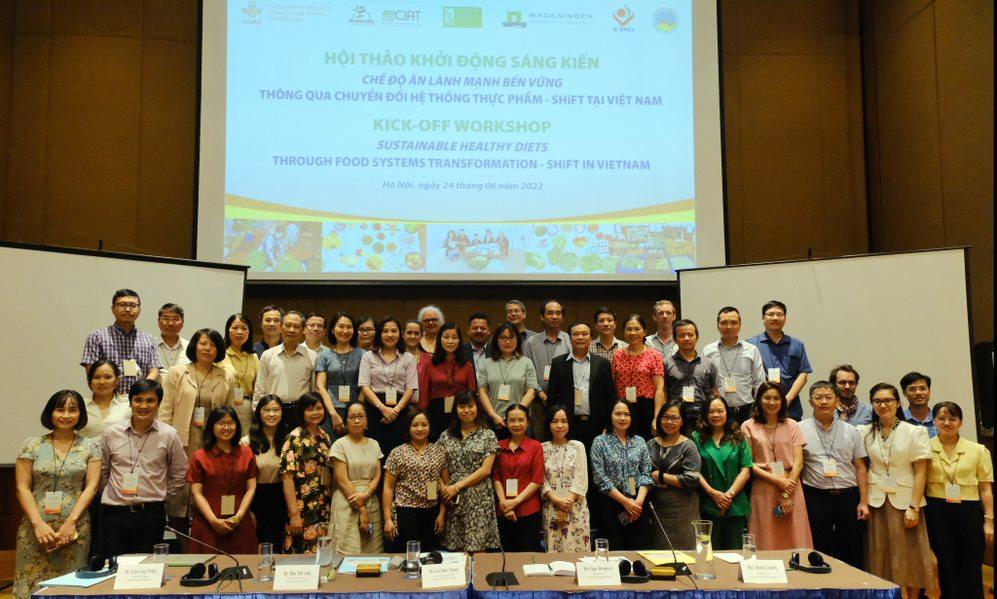Press and News Sustainable Healthy Diets through Food Systems Transformation (SHiFT) in Vietnam

To achieve its mission of delivering science and innovation that advance transformation of food, land, and water systems in a climate crisis, CGIAR has launched a new portfolio of Initiatives. Vietnam is one of the priority countries of CGIAR with nine initiatives to be implemented in the country.
Among the nine initiatives, SHiFT is the only CGIAR initiative with the primary focus on ensuring sustainable healthy diets for all through food systems transformation.
To achieve its mission of stimulating the demand for/consumption of sustainable healthy diets and the supply of nutritious, safe, affordable, and sustainably produced foods (sustainable nutritious foods), while also improving livelihoods, gender equity and social inclusiveness in all sectors of food systems, the SHiFT will work with multiple stakeholders in the Vietnamese food system. The initiative kicked-off on 24 June 2022 in Hanoi, Vietnam with a workshop to introduce the initiative, identify how the SHiFT fits in the National Development Strategies, and to explore collaboration mechanism in the implementation of the initiative to be in line with the food systems transformation process in Vietnam.
Mark Lundy, the Research Director of the Food Environment and Consumer Behavior team at the Alliance of Bioversity International and International Center for Tropical Agriculture and Deputy Initiative Lead provided an overview of the Initiative. He explained that the core of SHiFT’s mission lies on ensuring stakeholder engagement and building capacity through the co-generation and use of insights on potential innovations; understanding the barriers to change and power relationships among relevant stakeholders; and identifying and negotiating potential trade-offs and synergies in food systems transformation.
To highlight the alignment of SHiFT with national priorities, Mr Lundy noted that the workshop is “a key opportunity to meet, listen and discuss amongst work package leaders, partners, members of international and national research community, the private sector, and civil society organizations on the SHiFT to be in line with the food systems transformation process in the country”
Dr. Dao The Anh, the Vice-President of Vietnamese Academy of Agricultural Sciences (VAAS) expressed that “the food system transformation plays a crucial role in Vietnam and it is necessary to give a priority to the food system approach as it can address three issues, including maintenance of food and nutrition securities, assurance of food safety and adaptation to climate change. SHiFT is very aligned with the strategy of Vietnam in transforming food systems towards sustainability, transparency, and responsibility to achieve the Sustainable Development Goals in 2030”.
Dr Inge Brouwer, Associate Professor at Wageningen University & Research, emphasizes the need to zoom more into the consumers, and their food environment to look for food system innovations that provide access to healthy diets especially for marginalized populations. As these will be complex and integrated bundles of different interventions along the food system, governance of such changes is important and support to building capacity of governments and other agents to facilitate and manage such changes is key for SHiFT.
Work packages
Initiative and work package leaders presented on the five (5) work packages and their objectives:
Work package 1. Consumers and their food environment:
• Characterize food consumption, dietary patterns, and the nutritional and health status of consumers, and in particular, marginalized populations.
• Characterize food environments (FEs) of marginalized populations, how FEs shape dietary patterns, and how consumers shape FEs.
• Evaluate potentially scalable consumer- and FE-focused policies, innovations, and guidelines to shift consumption patterns toward sustainable healthy diets.
Work package 2. Micro, Small, and Medium Enterprises (MSMEs) and the informal sector:
• Identify MSMEs and informal actors who could contribute to the delivery of sustainable nutritious foods in the FE, highlighting opportunities and growth constraints.
• Identify potential innovations to overcome firm- and system-level constraints inhibiting the delivery and sale of sustainable nutritious foods to marginalized populations.
• Co-design, develop, and evaluate innovations targeted to marginalized populations with MSMEs and the informal sector working with sustainable nutritious foods to maintain or increase decent employment and income opportunities.
Work package 3. Governance and inclusive food systems:
• Identify policy and governance lock-ins and barriers maintaining food systems on their current unsustainable trajectories.
• Identify and document policy and governance lessons derived from system transitions and transformations in other sectors.
• Identify governance and policy solutions to address structural barriers, remove active resistance and enable transitioning food systems
Work package 4. Trade-off scenario analysis:
• Identify and, if possible, quantify trade-offs among food systems outcomes (e.g. healthy diets, gender and social equality, decent employment, etc.)
• Develop and implement decision-support tools based on food system trade-off and scenario analysis
• Raise awareness and improve capacity of national and subnational stakeholders to navigate food system trade-offs and policy prioritization
Work package 5. Catalyzing food system transformation:
• Engage in Vietnam’s national multistakeholder consultative processes to develop and support food systems transformation.
• Document food systems transformation process in Vietnam.
• Develop capacity to engage in, support, and document food systems transformation toward sustainable healthy diets in Vietnam.
The meeting was attended by representatives and various stakeholders from the International Cooperation Department and Department of Cooperatives and Rural Development under Ministry of Agriculture and Rural Development (MARD), Vietnamese Academy of Agricultural Sciences, National Institute of Nutrition, The Institute of Policy and Strategy for Agriculture and Rural development, and other research institutes (Hanoi Institute for Socio – Economic Development Studies, etc.), universities (Hanoi University of Science and Technology, Hanoi Medical University, etc.), small and medium enterprise support centres (under Department of Planning and Investment of Hanoi, Vietnam Chamber of Commerce and Industry), cooperatives, enterprises and consumers. In addition, the meeting also received the participation from local authorities of Moc Chau district of Son La province, Dong Anh and Cau Giay districts of Hanoi and other stakeholders.
For more information about SHiFT, contact Tuyen Huynh, SHiFT Country Coordinator and Research Fellow, The Alliance of Bioversity International and CIAT (ABC).
